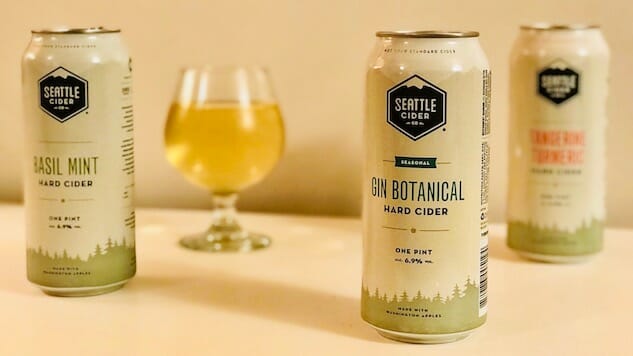Drinking 3 Ciders from Seattle Cider Company

Seattle Cider Company has the tagline “not your standard cider,” which is catchy, but I’m not sure that there is such a thing as a “standard” cider anymore. I guess you could still get the saccharine example of a hard cider that we all tried when it hit the market in a big way several years ago, but the category is so much more interesting these days, I’m not sure why you’d bother. Why drink a cider that tastes like a juice box when you can have something that’s as complex as a dry white wine, or as ethereal as a Champagne?
From what I’ve seen, Seattle Cider Company leans towards the interesting side of things. Yes, they have a staple semi-sweet cider that checks all of the juice box boxes (sweet? Check, apples? Check), and they have plenty of other options for those with a sweet tooth, from a maple cider to a pumpkin spice cider. But Seattle Cider Company is at its best when they’re crafting beverages that fall on the dry side of the spectrum—ciders that are light, crisp and tinged with subtle herbal adjuncts like basil.
Seattle Cider Company was the city’s first cider house, which is shocking because they only launched in 2013, but in just a few short years they’ve developed a hardy distribution footprint, selling their ciders in at least 15 states. I tried three of their ciders, all fermented with different herbal adjuncts to varying degrees of success. Here are my thoughts.
Tangerine Turmeric
I had high hopes for this one because turmeric is such a hot spice right now. Everyone’s using it. Old people are putting it on their toast because supposedly it allows you to live forever, and young people are mixing it in smoothies because it will give you six pack abs. At least, that’s what I read somewhere on the internet. So yeah, a cider with turmeric, and tangerine? Get six pack abs, live forever and fight scurvy? Sign me up. But of the three options, this was my least favorite.
The turmeric is all over this thing. The cider smells like soup and tastes like…turmeric. There’s actually a lot going on in this cider—layers of ginger and orange and some tart lemon on the back end—but the turmeric is overpowering, I can’t wade through it to enjoy the various layers. I could see this being a cider that grows on you. Something that, at first you struggle to get used to it, but eventually, over time, you begin to crave it. But I’m not there yet. I’m still in the struggling phase.
-

-

-

-

-

-

-

-

-

-

-

-

-

-

-

-

-

-

-

-

-

-

-

-

-

-

-

-

-

-

-

-

-

-

-

-

-

-

-

-








































